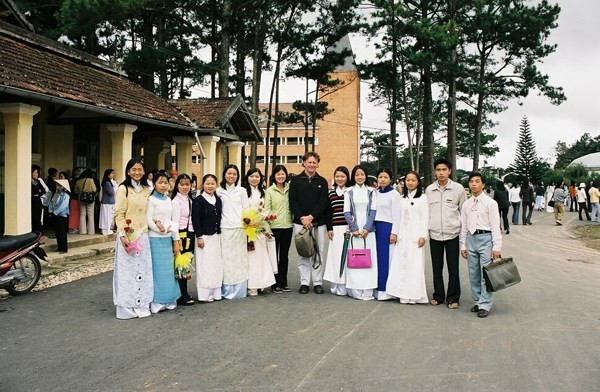(VOVWORLD) - In 1998 Ireland’s Doctor Colman Patrick Ross came to Vietnam to work, he never thought he would stay for 20 years. During this period he has lived and worked with ethnic minority people in 12 provinces across Vietnam. Their love for him and their difficult lives encouraged Dr. Ross to call on the Vietnamese government and foreign non-government organizations to do more to assist these ethnic minority groups and improve their living conditions. We’ll bring you excerpts of our talk with Dr. Colman Patrick Ross about Vietnam’s poverty reduction efforts and changes among the ethnic minorities.

Dr. Colman Patrick Ross and students of Da Lat Teachers’ Training College.
|
Over the past 20 years, you have witnessed Vietnam's developments. What do you think of the changes in the living conditions of ethnic minorities in Vietnam and the effectiveness of the Vietnamese government's support policies for remote areas?
There have been many changes since my first work in Da lat, Lam Dong to now in the north like in Son La, Lai Chau, Bac Kan, Cao Bang, Yen Bai, Quang Tri, and in all provinces I had worked. But I think it’s very hard to generalize because ethnic minority’s development is very diverse in VN. It’s a tendency to look at ethnic minorities as one. VN has 53 ethnic minorities and most of groups as well. It’s difficult to generalize about their changes. Of course there have been great changes in provisional services, schools particularly, house centers, roads, and the entire infrastructure has improved, in communications, the Internet with phones. All those things didn’t exist in many places 20 years ago. There’s a huge stride in development.
Can you give some examples of changes among some of the groups? Has development been more successful in some regions than in others? If so why?
Unfortunately the answer is yes. Some regions and provinces have developed more sustainably than others. For example, Thai people including White and Black Thai, and Muong ethnic groups have made great strides. I think it’s because of two things: one is homogenies that they tend to live in communities that have been defined. They have been living in valleys and areas that are more connected to Kinh’s areas, more connected to urban areas, to bigger provincial centers. So they have developed at a greater rate than the more remote ethnic groups like we say Dao or H’Mong, particularly in the north. There’s another reason for this. It is related to my thesis as well is that the literacy levels of these ethnic minority communities are higher and part of this reason is that their access to education is easier. Their children can go to primary schools, secondary schools. Sometimes without boarding schools they can go home every day. This education has been a big factor in the development of these groups….. Infrastructure alone won’t bring sustainable development it is people and communities.
Education plays a key role in boosting development and reducing poverty in ethnic minority areas in Vietnam. This was the topic of your doctoral thesis. Can you elaborate on this point?
I got the idea for my PhD when I was working in Quang Tri, Yen Bai and Ha Giang. I noticed that the people in Gio Linh and Vinh Linh were more aware of the project objectives than people in Yen Bai and Ha Giang. I saw this was connected to literacy in Kinh and that the project was communicated in Kinh mostly so people with better levels of literacy were at an advantage. The empowerment was connected to communication and when the ideas had to be translated then they lost some of their meaning. Adult Basic Education is vital for development. The New SDGs recognise Live Long Education as key for personal and community development. Women with better education keep their children longer at school and support them to find alternative livelihoods and in turn young adults are taken out of the vicious circle of poverty. There are many Ethnic Minority women who did not get a chance to complete primary school and it is never too late to learn. To ignore adults and only concentrate on children is a mistake that will have negative effects going forward. Education is a Life Long endeavor not a schooling experience.

Dr. Colman spends most of his time in Vietnam working with ethnic minority people across the country.
|
What are the hurdles to education for Vietnamese ethnic young people?
I think it’s the access to schools. But access to primary schools, secondary schools, and high schools is different. There’s a great access to primary schools because primary schools can be built in communes that are close to villagers. But as you go up higher to lower education particularly to upper secondary schools because it’s very difficult for children to attend. There have been many projects or programs to support the building of schools. I think they need to be more consideration of where these schools will be built. If you want the children to go to boarding schools, there must be a commitment from their families and maybe many families don’t want their children stay in the school for a long period of time and not to come home at the weekend. They spend a lot of time away from home where they can also work on farm. What happen after education is their jobs for young ethnic minority. It’s the same in urban areas. Job is the end of all commitments to education. People might say there is no return. They say they make a big investment in education for their children but now they have no jobs. We need to help them with job opportunities that compliment during years in school. We need to help them well organize technical schools and regional colleges which will provide young ethnic minority graduates technical skills for finding jobs.
Thank you for this interview!.